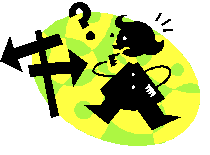The World of
Grandpa Don
Out-Sourcing Our Jobs
With unemployment as high as it is, many are
disturbed that many of our jobs have been "out-sourced" to foreign countries. It
has become a major problem.
Improvements in transportation and low wages
in third world countries have made it economical for companies to manufacture
goods there and ship them here. The upside theory is that as the cost of
production goes down, corporate profits can go up and/or consumer prices can go
down. The investor and the consumer will gain.
The downside is that this results in loss of
employment in this country. Besides the human factor, it reduces the overall
buying power here, forcing prices down as well as profits.
Thus, the economy is in constant flux,
delicately balanced. When you think about it, this is always the case. We are
not a “farm” economy with all goods and services produced and consumed locally.
There was a time when, if a product was not available, we did without. In this
country we are reluctant to do without and are constantly striving to raise our
standard of living. We not only refuse to lower our wages and benefits, we
continually demand more. A raise has become an annual "right" of employees.
The reaction to the problem is to ask
government to impose trade restrictions of various kinds in an effort to
increase the cost of imported products to the point where it becomes more
economical to produce them at home. Not too long ago, this action would penalize
foreign companies and bolster the companies producing goods in the US. But the
producers of goods have become multi-national corporations and tariffs may hurt
US investors. To make matters more complicated, investing is no longer limited
to the wealthy. The middle class now either own stocks and bonds directly or
through retirement plans of various sorts.
We tend to think that this situation is new to
the world. It is not. It is a situation that has existed since people started
trading with each other. It has been exasperated by modern transportation and
communication as well as increased population. There is always a short term
imbalance of supply and demand.
Is there a fair solution to the problem? If
you mean “fair” in that it doesn't adversely effect us, I don’t think so. Let’s
be honest. We look to our own comfort first. We sit in church and listen to the
missionaries talk about the poverty at their missions and maybe a tear comes to
the eye. In any case, we drop a couple bucks in the basket and our mind is set
at ease. We have provided food for a few days for those poor unfortunates. Maybe
the long term solution would be to give them jobs. Oops, that is what the multi
national companies are doing. True, they are not motivated by any noble or long
term solutions to world poverty but they are taking advantage of the lower
standard of living in these countries. Worse yet, in some cases they are taking
advantage of social structures which allow them to exploit the poor. (But that
is a different issue.)
The short term solutions are never fair to
everyone. But they lead to the long term solutions if they are allowed to take
their course. The problem is TIME. It will be a very long time before wages and
the standard of living in third world countries rise to our level. Hopefully
ours will not go down towards theirs, at least not too much. We do not live in
isolation. We are, like it or not, a world community. For now (the next couple
millennium, maybe) we will always be in imbalance for the short term. But, think
about it, … who is hurting more, "us" or "them"?
God created this world and everything and
everyone in it. There are enough resources to support all of us. Some have a lot
and some have almost nothing. Not many of us can sell all we have and give it to
the poor and we are not asked to do that. Most of us do have jobs or sources of
income. What we can do is lend a hand to relatives or neighbors who do not. The
alternative would be have those people come here. That will happen to some
extent but is not a viable solution to the problem. (Yet, another issue.)
In any case, we have to stop thinking in terms
of “them” and “us”. We are all God’s children, brothers in the site of God. It
is not easy to separate our (selfish) interests from our obligation to be
stewards of God's gifts. But we at least must become aware of the nature of the
problem and ask, "What does my Christian faith tell me to do?"
Thoughts About
...
Living
The 'things' we encounter in our lives and choices we must make.
|

|
|
Out-Sourcing Our Jobs
Don Plefka
© 9/29/2003 |
The
World of Grandpa Don
www.plefka.net
Living
|
|
|
Free JavaScripts provided
by The JavaScript Source
|
